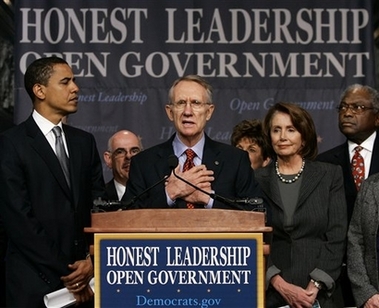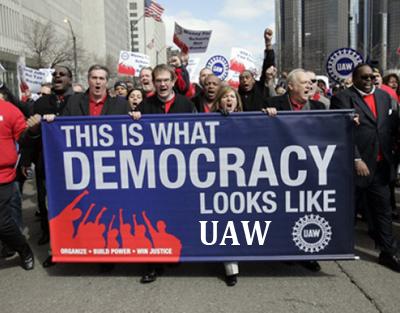Obama's Forgetten Delphi Workers
Three Cars Per Space As President Barack Obama touts his bailouts for the automakers as a key component of his economic success, it is important to not forget the worker’s of Delphi and…

Three Cars Per Space As President Barack Obama touts his bailouts for the automakers as a key component of his economic success, it is important to not forget the worker’s of Delphi and…
Teacher's in Chicago, Illinois have voted to authorize a strike over their demand for a 30% pay increase (funded by the taxpayers) and smaller classroom sizes. The union wants a two-year deal that reduces class size and calls for teachers to receive a 24 percent pay raise in the first year and a 5 percent pay raise in the second year. The strike would start at the beginning of the next school year should the union not come to terms with Mayor Rahm Emanuel. With their neighbors on one side in Indiana enacting a Right to Work statute and their neighbors on the other, in Wisconsin, enacting reforms to save taxpayers money, it is clear Big Labor in Illinois hasn't gotten the message. Taxpayers want reform, choice, efficiency and freedom. That message will take root in Illinois soon. Emanuel spokeswoman Sarah Hamilton said the public schools cannot afford a strike. "At a time when our graduation rates and college enrollments are at record highs – two successes in which our teachers played an integral role – we cannot halt the momentum with a strike," she said. "Our teachers deserve a raise, but our kids don't deserve a strike and taxpayers cannot afford to pay for 30 percent raises." You might remember this video from a previous Chicago/Illinois Teachers Union staged event titled "Give up the bucks!"
Teacher's in Chicago, Illinois have voted to authorize a strike over their demand for a 30% pay increase (funded by the taxpayers) and smaller classroom sizes. The union wants a two-year deal that reduces class size and calls for teachers to receive a 24 percent pay raise in the first year and a 5 percent pay raise in the second year. The strike would start at the beginning of the next school year should the union not come to terms with Mayor Rahm Emanuel. With their neighbors on one side in Indiana enacting a Right to Work statute and their neighbors on the other, in Wisconsin, enacting reforms to save taxpayers money, it is clear Big Labor in Illinois hasn't gotten the message. Taxpayers want reform, choice, efficiency and freedom. That message will take root in Illinois soon. Emanuel spokeswoman Sarah Hamilton said the public schools cannot afford a strike. "At a time when our graduation rates and college enrollments are at record highs – two successes in which our teachers played an integral role – we cannot halt the momentum with a strike," she said. "Our teachers deserve a raise, but our kids don't deserve a strike and taxpayers cannot afford to pay for 30 percent raises." You might remember this video from a previous Chicago/Illinois Teachers Union staged event titled "Give up the bucks!"

Well, actually, President Barack Obama did very little to help his Big Labor Boss friends in Wisconsin. These are the same union bosses that spent over $1-Billion in forced-dues to get Obama elected president and to keep Nancy…

The UAW has a formula to help their members -- spend more on politics. The current strategy will soon, according to the blog Truth About Cars, lead to another bailout -- this time solely for the union: It’s said that people do resemble their dogs. The UAW surely looks more and more like the GM of old. For years, the UAW has spent more than it took, forcing it to live off its savings. Once again, the UAW wants to change this – two years from now. Until then, it will happily go on making losses. Said Bob King to Reuters: “We are spending a lot of money, and we’re investing money in organizing. And we’re investing money in rebuilding the ability of the UAW to win good contracts and win good legislation for our membership.” King told Reuters that in two years, the UAW wants to be cash-flow positive by adding members and managing costs.

Sen. Joe Manchin is often seen as one of the more conservative Democrats in the Senate but when it comes to the rights of workers, Manchin still dances to the tune of the union bosses. The Huntington News in West Virginia takes him to task for his ongoing relationship: Sad news [last] week for Big Labor and its D.C. allies like President Obama and U.S. Senator Joe Manchin. When no one is looking, Senator Manchin reverts to form and backs the President and his NLRB in a transparent Big Labor power grab. Monday, Federal Judge James Boasberg of the U.S. District Court for the District of Columbia struck down a new rule "passed" by two members of the National Labor Relations Board. Interestingly, Judge Boasberg is an Obama appointee. Ironically, this rule designed to circumvent proper procedure was cancelled because the court found that the NLRB itself did not use proper procedure in promulgating the new rule. Simply put, the court found that no quorum was present as those backing the new regulation tried to ram through their favor for Big Labor.

Sen. Joe Manchin is often seen as one of the more conservative Democrats in the Senate but when it comes to the rights of workers, Manchin still dances to the tune of the union bosses. The Huntington News in West Virginia takes him to task for his ongoing relationship: Sad news [last] week for Big Labor and its D.C. allies like President Obama and U.S. Senator Joe Manchin. When no one is looking, Senator Manchin reverts to form and backs the President and his NLRB in a transparent Big Labor power grab. Monday, Federal Judge James Boasberg of the U.S. District Court for the District of Columbia struck down a new rule "passed" by two members of the National Labor Relations Board. Interestingly, Judge Boasberg is an Obama appointee. Ironically, this rule designed to circumvent proper procedure was cancelled because the court found that the NLRB itself did not use proper procedure in promulgating the new rule. Simply put, the court found that no quorum was present as those backing the new regulation tried to ram through their favor for Big Labor.
A progressive blog has determined that teacher’s union in Michigan has already kicked in $1.8 million toward a preemptive strike to prevent the enactment of a Right to Work law in the state. Have no fear, millions more in forced union dues will be…

The Senate's premiere champion of worker's rights, Sen. Jim DeMint, outlines his support for a balanced approach to labor law. From Greenvilleonline.com: When people ask me if I’m pro-business or pro-labor, I say I’m neither: I’m pro-freedom. Freedom is the only political principle that cannot be bent to serve special interests. Remember how 7-Up used to call itself the un-cola? Well, freedom is the un-special interest. Freedom, protected by the Constitution and the rule of law, works for everyone. It allows everyone — left or right, young or old, rich or poor — to make their own choices according to their own values. Government’s job shouldn’t be to tilt the field for one team or another, but to guarantee a level playing for everyone. That’s why I’m against forcing workers to join unions, congressional earmarks for favored groups, government bailouts of Wall Street, and energy subsidies — both for oil companies and for green energy. Freedom isn’t perfect, but it is fair. And any time government hands out favors, they’ll be unfair to someone. When Washington picks winners and losers, in the end taxpayers always lose, and Ex-Im is no exception.